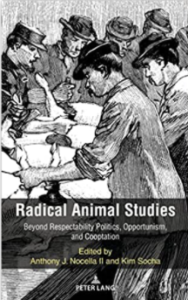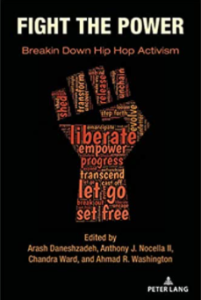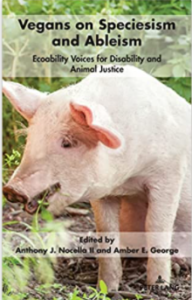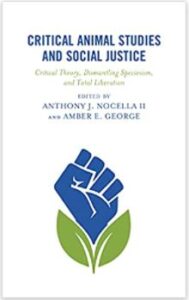Karen Davis
Single-Issue Campaigns and Abolition/Vegan Advocacy: Is There a Conflict?
By, Karen Davis, President of United Poultry Concerns
Abstract
I am in Brooklyn, New York on a fall day looking at a stack of crates on the sidewalk filled with live chickens. Sickened by this sight, do I as an animal rights activist just skip over the chickens and proceed to tell anyone who will listen about the importance of going vegan?
For some Abolitionists, all campaigns focusing on particular animals frustrate the goal of Abolition, Animal Rights, and Veganism. My organization United Poultry Concerns promotes the compassionate and respectful treatment of domestic fowl. This makes us a “single issue” or “single class of animals” operation. Does our focus on chickens and turkeys hamper efforts to liberate all animals from all forms of oppression everywhere on the planet?
Campaigns on behalf of specific human groups have been waged throughout history. Was the campaign to end Apartheid in South Africa a “single-issue” campaign that thwarted the overall effort to liberate all people everywhere on earth from legalized discrimination? What about the suffragist movement or the civil rights movement or the gay rights movement in America? Don’t they constitute “single issues” within the universal drive for social justice? And do they not break down further into specific campaigns for voting rights, equal opportunity in education, anti-housing discriminating, affirmative action and so forth?
If so, then it is important to inquire whether addressing a particular category of animals or animal abuse necessarily precludes an inclusive advocacy on behalf of all animals. Does focusing on chickens prevent me from contextualizing their suffering within a broader range of issues? My experience as a Chicken Rights activist for 25 years says that one can develop the skills that are needed to do both while pursuing specific objectives.
I argue that every well-crafted campaign for animals provides an opportunity to promote the vegan message and the goal of animal liberation. I personally like the term animal liberation better than abolition because animal liberation is a positive sounding goal featuring the animals themselves as opposed to the more abstract and negatively framed objective in which we, instead of they, are the focus. Perhaps it is fitting that a philosophy in which individualized animals and campaigns are more or less frowned upon should define itself verbally in a way that obliterates the animals from view. Abolition, Veganism. It is easy for the animals to disappear in closed-circle discourse about Ideology and Food. As animal advocates, we cannot let this happen.
I argue that animal advocates must strive to integrate and insinuate vegan advocacy and animal liberation into all of our efforts to help animals. We must advocate passionately for the ultimate goal of Animal Liberation and with equal justice, passion and conviction for this bird, this particular individual in the here and now. Drawing on my professional experience with particular examples, I will describe how this may be done.
Bio
Karen Davis, PhD is the Founder-President of United Poultry Concerns, a nonprofit that promotes the compassionate and respectful treatment of domestic fowl including a sanctuary for chickens in Virginia. She is the author of Prisoned Chickens, Poisoned Eggs: An Inside Look at the Modern Poultry Industry; More Than a Meal: The Turkey in History, Myth, Ritual, andReality; and The Holocaust and the Henmaid’s Tale: a Case for Comparing Atrocities. Her essay “Procrustean Solutions to Animal Welfare Problems” appears in Critical Theory and Animal Liberation.
Karen published “From Hunting Grounds to Chicken Rights: My Story in an Eggshell” in Sister Species: Women, Animals, and Social Justice. Her essay “The Mental Life of Chickens” appears in Experiencing Animal Minds: An Anthology of Animal-Human Encounters, and her article “From Animal Oppression to Animal Liberation: A Historical Reflection” is the Afterword in Defining Critical Animal Studies: An Intersectional Social Justice Approach to Liberation. Karen’s chapter “Anthropomorphic Visions of Chickens Bred for Human Consumption,” in Critical Animal Studies: Thinking the Unthinkable, analyzes the transformation of farmed animals into mutilated forms of existence as a “welfare improvement.”Karen Davis is in the National Animal Rights Hall of Fame for Outstanding Contributions to Animal Liberation. http://www.upc-online.org/karenbio.htm





